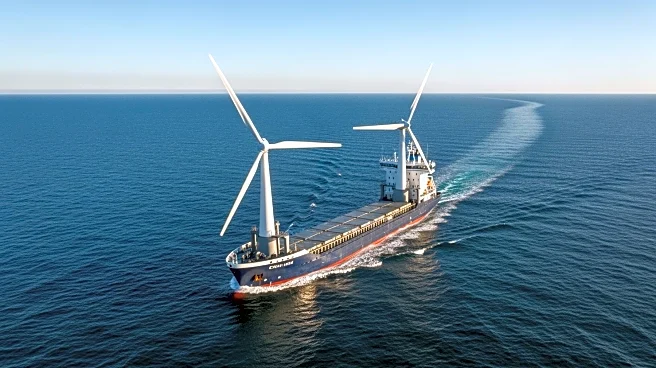What's Happening?
The International Maritime Organization (IMO) is emphasizing the role of wind propulsion as a key technology in achieving net zero emissions in the shipping industry by 2050. The IMO's Marine Environment
Protection Committee is expected to adopt the Greenhouse Fuel Index (GFI) to provide clarity and alignment among parties. Wind propulsion, which can reduce fuel consumption and emissions by 5-25%, and up to 70% in favorable conditions, is being recognized as a practical and scalable solution. The International Wind Shipping Association (IWSA) is advocating for consistent and equitable treatment of wind propulsion within the IMO's regulatory framework.
Why It's Important?
The shipping industry is responsible for approximately 3% of global greenhouse gas emissions, making it a significant contributor to climate change. By adopting wind propulsion, the industry can significantly reduce its carbon footprint, aligning with global net zero targets. This shift not only promises environmental benefits but also offers economic advantages by lowering energy costs compared to alternative fuels like ammonia, methanol, and hydrogen. The recognition and integration of wind propulsion into regulatory frameworks could accelerate its adoption, ensuring better compliance and long-term investment in sustainable practices.
What's Next?
As the IMO's Marine Environment Protection Committee convenes, stakeholders are expected to discuss the integration of wind propulsion into the Net-Zero Framework. This could lead to increased investment in wind propulsion technologies and further development of regulatory and incentive mechanisms. Shipowners and operators may begin to adopt wind propulsion more widely, driven by both regulatory requirements and the potential for cost savings. The industry will likely see a shift towards more sustainable practices, with wind propulsion playing a central role in reducing emissions.
Beyond the Headlines
The adoption of wind propulsion in shipping could have broader implications for global trade and environmental policy. It may set a precedent for other industries to explore renewable energy sources, contributing to a larger shift towards sustainability. Additionally, the focus on wind propulsion highlights the importance of innovation and technology in addressing climate change, encouraging further research and development in renewable energy solutions.












